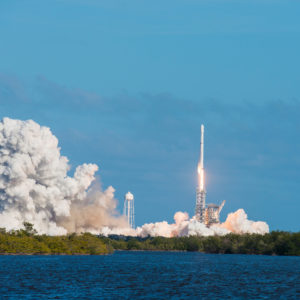It’s now T-minus one month before the Air Force makes the decision of which aerospace companies will have the opportunity to shape the future of American spaceflight. Private companies like Blue Origin, Northrop Grumman, SpaceX and the United Launch Alliance have until August 1, to submit their bid requests to the Air Force. These bids will determine which firms will be contracted to build and launch rockets for the United States’ coming spacefaring missions. Of those companies, only two will be selected to shepherd the nation’s space launch capabilities in the coming decades. The selection process is a huge responsibility, and one that the Air Force does not take lightly.
On May 3, the Air Force opened contract bidding for the second phase of the National Security Space Launch (NSSL). It’s about time. The NSSL is the heir to U.S. space programs created in the 1950s to ensure our essential military and intelligence communities had reliable access to space. Launching and maintaining satellites is critical to national security. Space transportation is so vital, in fact, that President George W. Bush issued a National Security Presidential Directive addressing the issue.
NSSL has done some terrific work over the last 20 years, with more than 75 critical missions to ensure our national security. The Air Force’s next step is the NSSL’s second phase, which is open for bids. Since the Air Force is America’s launch platform for the military and intelligence communities, this represents a major step forward in our nation’s security.
One widely shared concern of the NSSL was the reliance on Russian-made rockets. Congress shared this concern and ordered the Air Force to find other, non-Russian rockets for the program in 2014. This is in large part due to the Russian threat to ban the sale of their rockets to the United States, fulfilling a long-held fear by national security strategists.
One obstacle to executing Congress’ mandate to transition away from Russian rockets is, ironically, members of Congress. Specifically, House Armed Services Chairman Adam Smith. Smith is insisting on an independent investigation into the procurement matter, along with delaying the entire program. The Air Force has already slowed the procurement timeline by two full years to satisfy congressional concerns that the program might be going too fast to allow industry time to ramp up their offerings to meet the needs of national security.
Smith’s insistence on an additional delay is puzzling. After a thorough and transparent approach by the Air Force, Smith wants the Air Force to reconsider. Most troubling is that he also wants to further delay the program. The congressman doesn’t offer any reasons he thinks regulations or laws have not been followed. He doesn’t say why the already completed independent reviews were flawed, nor does he address the exhaustive process the Air Force used to resolve hundreds of comments on the program.
Blue Origin, a major aerospace manufacturer, also wants a delay. Delay requests by vendors are common, as companies want to have time to qualify to bid on this or that project. However, a particular vendor’s timing preference shouldn’t be a factor in our national security decision making. Blue Origin is based in Adam Smith’s congressional district.
More than two dozen lawmakers have called for the program to move forward without additional setbacks. The Air Force is right in deflecting politically grounded postponement requests and pushing forward with NSSL. The Air Force knows that each day of unneeded delay in this vital program is another day we are relying on the good graces of Russia to let us use their rockets.
Ultimately, the Air Force is doing what it was meant to do: protect the national security interests of the country, while not kowtowing to the corrosive effects of political pressure.
The Department of Defense recognizes that additional and unnecessary setbacks would lead America into a state of greater dependence on Russia and its rocket engines, potentially compromising our spacefaring capabilities and national security. That cannot be allowed to happen.
There is no reason for further delays in the program. While Congressman Smith’s advocation for a company in his home district is understandable, such political decisions shouldn’t extend our reliance on the Russians for our rockets.

